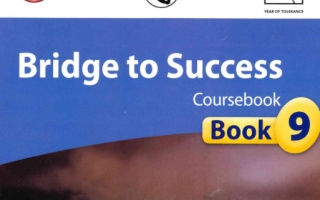كتاب الطالب اللغة الإنجليزية الصف التاسع الفصل الثالث
Reading
Read this extract about a book. What is remarkable about Juliane's story
Juliane Koepcke was 17 when she was flying with her mother to Lima in Peru. Lightning struck the plane and there was an explosion. Suddenly, she was falling through the air, still strapped to her seat, 3,000 metres above the Peruvian rainforest. She lost consciousness and when she came round, she was still strapped into her seat. She had cuts and bruises on her arms and legs and she had broken her collarbone, but that was all. She was the only survivor out of the 92 people on board. "I was too shocked to feel frightened," she says. "When I heard the sound of running water, I knew I had to follow it, because a river would lead to human settlement." Her survival instinct took over. She drank dirty water and walked for ten days in the rainforest before she was found. "The accident changed me completely," she says. "I have learned that life is precious - that it can be taken from you at any moment. I came so close to death then that everyday stress no longer affects me. Trivial things don't worry me any more "
Use of English: Comparative adverbs
Comparative adverbs show the difference between how two things are done. If the adverb is regular (it ends in -ly), to form the comparative adverb, use more + adverb (than): The operation was completed more quickly than the rescuers had originally estimated. If the adverb doesn't end in -ly, to form the comparative adverb, add -er to the adverb and don't use more: I can run faster than you. You can hold your breath longer than me. Some comparative adverbs are irregular: adjective = good adverb = well comparative adverb = better The operation worked better than the rescuers had originally estimated. Some adverbs which end in - ly have irregular comparative forms: adjective = bad adverb = badly comparative adverb = worse He sings worse than me. To make comparisons stronger, use much + more + adverb (than). The rescue operation was reported much more widely than previous mining rescue attempts
Reading
Read Hamad's post and the replies. Match each reply to one of the pictures (1-3)
Fear of public speaking
My teacher has asked me to speak at the end-of-year assembly and I'd love to, but there's one small problem. I'm really scared of speaking in public. Does anyone else feel the same, or is it just me? Hamad, 14
You're not the only one I have a fear of public speaking. My class won a national Science competition when I was in Year 6 and I gave a short thank-you speech at the awards ceremony in a very grand hall. I remember I couldn't read my notes because my hands were shaking so much. Don't get too nervous! Breathe deeply - it helps. Hugo, 15
When I was 10, I took part in a storytelling competition. There was a big audience, and I was doing really well until an insect landed on my nose and it wouldn't go awayl All my attention was on the insect so I forgot what came next. But don't worry - that won't happen to you. Stay calm and you'll be fine Ibrahim, 15
Last year, we had two exchange students from the USA. I offered to give a short speech in class to welcome them. I thought it would be easy so I didn't prepare at all - bad decision! I stood up and my mind went blank. My teacher helped me get started, but I was a bit embarrassed. My advice? Don't be over confident. Prepare a speech and practise it Robert, 14
Lessons 5 - 6 Practice makes perfect
What makes a good speaker and a good speech
Speaking
You are going to read an article giving advice about public speaking. Before you
read, write down four ideas of your own. Compare them in small groups
Reading
2 Read the article once. Were your ideas similar to the writer's advice
Four Little Tricks to make you a great public speaker
For many teenagers, standing up and speaking in front of an audience is their worst nightmare. You can try to avoid it, but sooner or later you'll probably be asked to do it. It could be for a school presentation, at a family get-together, to receive a prize, and so on. So what can you do to feel confident when everyone's attention is on you
Spend time writing your presentation or speech. Think about who your audience is and what you want to communicate to them. Make sure your sentences aren't too long. If they are, they might be too complicated for your audience to follow. Remember to use full stops and commas. These show you when you need to pause and take a breath
Remember the saying: Practice makes perfect. Practise your speech at home with your family and friends. Make notes to remind you what you want to say, but don't just read out what you wrote. You should try to sound natural and convince people you know what you're talking about. On the big day, stand up straight and clear your throat before you start - you could even take some water with you. Speak loudly and clearly. Look up from your notes to your audience. If you get nervous, look for friendly, smiling faces in the audience to make you feel better. Don't miss an opportunity to speak in public. This is an important life skill, which you will find useful on many personal and professional occasions. The first few times you might not perform so well, but every time you give a speech, you'll get better at it and you'll enjoy it more


